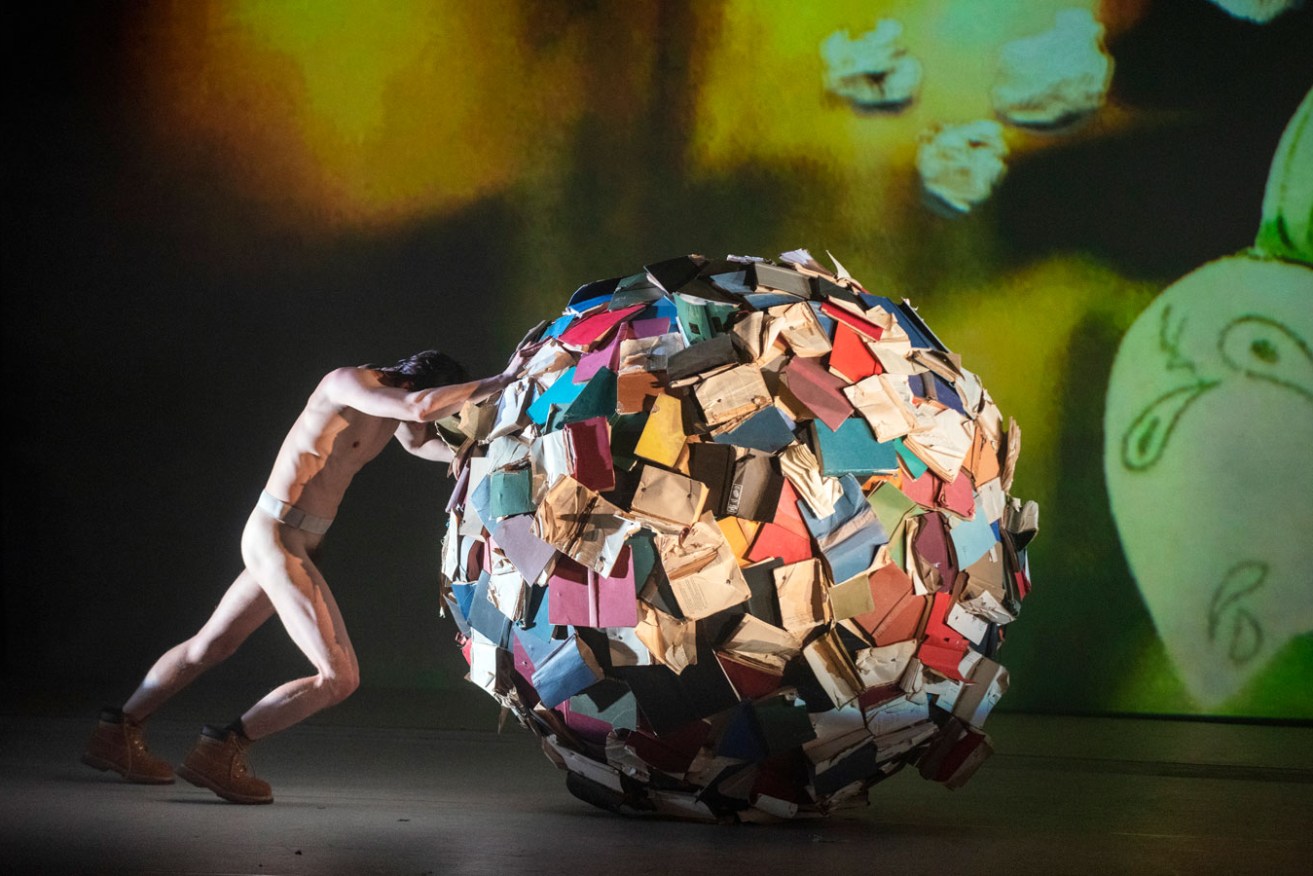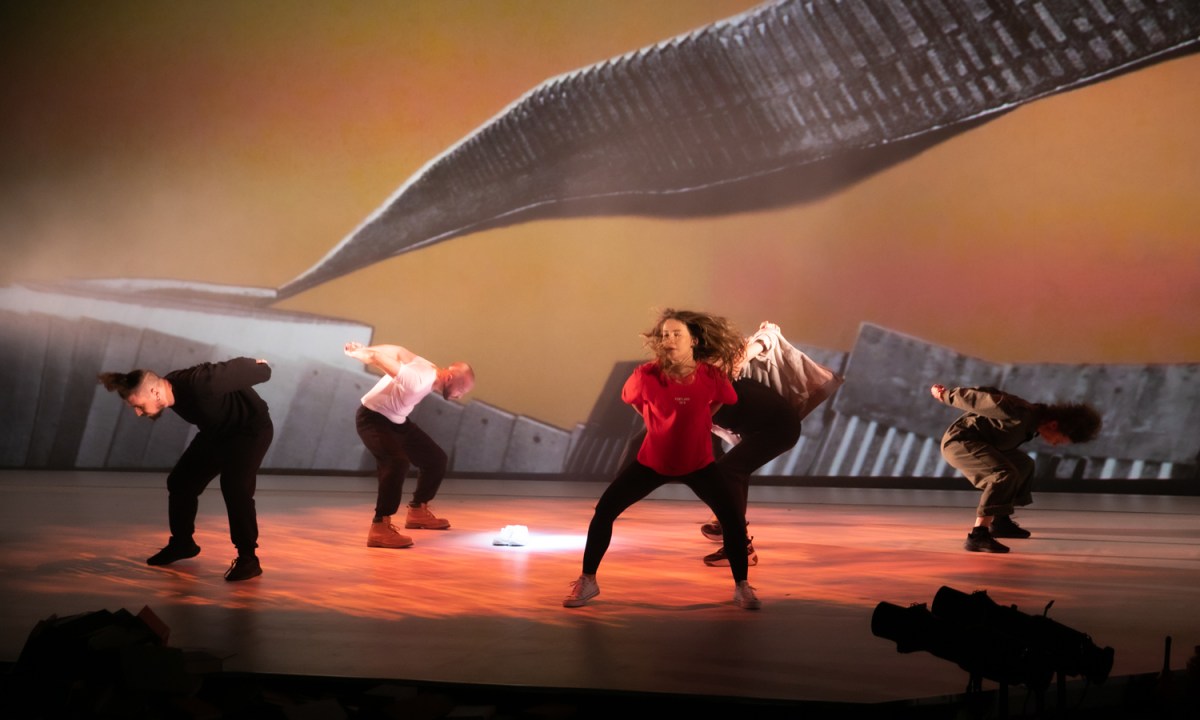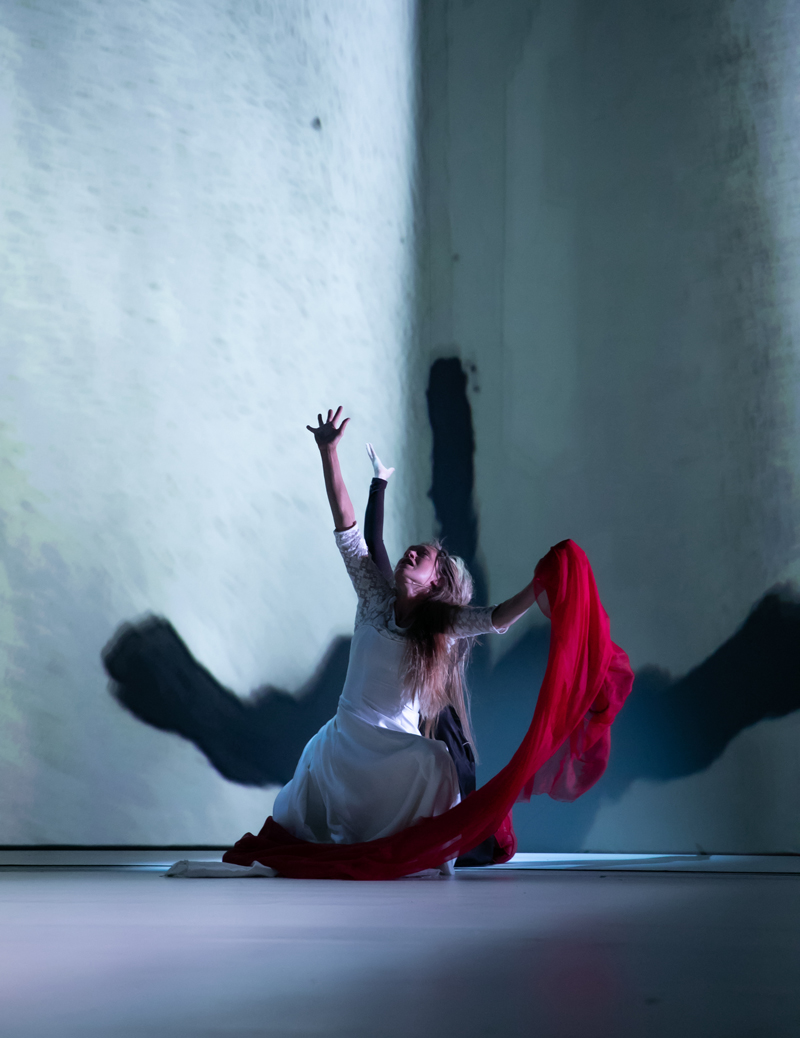Adelaide Festival review: Dogs of Europe
Belarus Free Theatre strong-arms art and activism into this fiercely subversive and politically prescient spectacle.


'Dogs of Europe' is a heady, confronting and at times confusing mix of art, activism and theatre. Photo: Linda Nylind
Dystopian politics, absurdist humour, fairytale and computer-game imagery, intense choreography and a gut-wrenchingly beautiful soundscape – it’s a heady mix for storytelling. But given the background of Belarus Free Theatre, this production was always destined to be more than a simple play.
Every member of the troupe is now in exile from their Belarus homeland, having escaped persecution under Lukashenko’s repressive regime after the dictator’s crackdown on freedom of expression following the protests of 2020. Banned from performing in Belarus and scattered across Europe as refugees, the ensemble continued to rehearse. Before 2020, those still in Minsk gathered in secret, connecting with founders Nicolai Khalezin (director, set and costume designer) and Natalia Kaliada (co-director and artistic director) in London via video link.
This determination to speak out against tyranny and perform in the face of imprisonment is an ever-present spirit of defiance on stage.
When the players began working on Dogs of Europe, they thought it was a play about a dystopia – an imagined future in which Russia has become an authoritarian superstate. Yet with the Russian invasion of Ukraine now entering its second year, this performance has come to appear less a vision of a nightmarish future and more a prescient call to action against the escalating threat of authoritarianism in Eastern Europe.
Based on the 2017 banned dystopian novel by Alhierd Bacharevic, the story swings from 2019 to 2049, depicting a version of Europe in which Russia has swallowed a huge number of nations to become a sprawling dictatorial superstate, the New Reich, stretching from Finland to Korea. In the west, the European Union has become the League of European States, opposed to the New Reich and separated from it by The Great Wall.

Belarus Free Theatre’s Dogs of Europe. Photo: Adam Forte, Daylight Breaks
The action on stage begins in 2019, with black-clad men abducting a grandmother from her isolated farmhouse. This fuses into powerful yet disturbing scenes using dance and physical theatre accompanied by the breathtaking vocal laments of Mark and Marichka Marczyk of Balaklava Blues. Then we are thrust into a high-school time-capsule project.
Before we can blink it’s 2049. Belarus no longer exists within the New Reich and the Russians have renamed the Belarusian villages as White Dews, followed by a number.
In White Dews 13 lives Mauchun, a 15-year-old schoolboy who smells of geese, and Mr Kakouski, a strange man with a fake gun and an unrelenting desire to escape, who refuses to believe it’s 2049. In the forest beyond the village, Mauchun witnesses a woman parachute in with a suitcase strapped to her back.
After the interval we are swept across the League of European states, with a German agent in search of a Belarusian poet, visiting bookshops piled with discarded books, places where people have access to knowledge and individual rights but fail to appreciate what they possess.

Dogs of Europe. Photo: Adam Forte, Daylight Breaks
Dogs of Europe is a dizzying collage of swift scenes crammed with music, fierce movement and a healthy serve of European absurdism. The action is non-stop – characters never statically deliver lines. Everyone is constantly in motion, making it a challenge to follow the translations projected on the backscreen while also keeping an eye on the action.
It is an, at times, discombobulating spectacle, but the viscerally haunting songs and music by Mark and Marichka Marczyk alone are worth the ticket price. Maria Sazonova’s choreography is ferociously physical, acting out protests, battles, rape and murder with acrobatic verve. The video projections (design by Richard Williamson and animation by Roman Liubyi) act as the set, switching from hand-held location filming to computer graphics to absurdist collage, all with a lurching, almost sea-sickness-inducing quality that escalates our sense of instability.
What is happening? What does this mean? There’s a swift piling of scene upon scene; absurdity and physical comedy punctuated with dance and song. Before we can make sense of what we’re seeing, the next is upon us. It’s a clever means of disempowering the audience, giving us a taste of the constant state of confusion, irrationality and powerlessness of living under a totalitarian regime. The ensemble cast are mesmerising – their energy unflagging for the entire three-hour production, especially the cast member who runs laps of the stage, naked, for the entire duration of the interval.
Dogs of Europe is a heady, confronting and at times confusing mix of art, activism and theatre, with all its many elements working together to create something bigger than the sum of its parts. This is an act of theatrical rebellion that ultimately does not hide its message. Stand up. Defend democracy and freedom. Because this cast knows firsthand exactly what it is like to lose it.
Dogs of Europe is playing at the Dunstan Playhouse until March 6 as part of the 2023 Adelaide Festival.
Read more Adelaide Festival coverage here on InReview.




